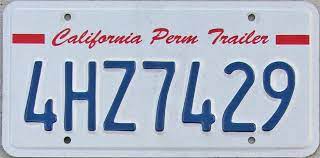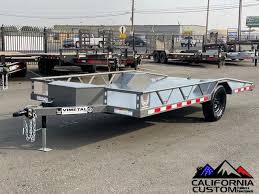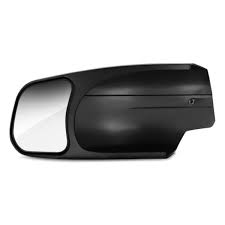California Trailer Laws and Regulations
If you often find yourself towing heavy loads around your state you probably have some idea of the state laws and rules that apply to do this. Some people may not be aware however that sometimes laws can differ state by state. This can mean you might be legal in one state but crossing the border you might well get pulled over for an infringement you were not expecting.
In this article we are going to look at the laws for California which may vary from the state you might be driving in from. There may also be regulations you were not aware of as a native to the state which might catch you out. So read on and let us try and keep you from costly tickets.
Do Trailers Need to be Registered in California?
California has no shortage of rules so it is hardly surprising that you definitely need registration for your trailer in this state. Firstly though and probably quite logically you do need a driver's license and you must have it with you to legally tow a trailer. This may seem like a no brainer but if you do not have one you can be pulled over and citied.

The trailer must be properly registered and the current tags must be affixed to the rig itself. Failure to get this registration and display it, again can cause you to be fined. These regulations apply to those from out of state as well so be aware of this before towing something into California.
California General Towing Laws
These are general rules in California regarding towing that you might come foul of if you were not aware of them. Sometimes you may get away with an infringement of these rules because you did not know them but you can not assume this will be the case.
- Passengers are not allowed to ride a trailer coach while it is being towed
- Passengers can ride in a fifth-wheel trailer coach while it is being towed
- A camper with people inside must have an unblocked door that can be opened from both inside and outside.
California Trailer Dimension Rules
It is important to know the state laws governing the sizes of loads and trailers. You may need permits for some loads while others may not be allowed on certain types of roads.
- The total length of tow vehicle and trailer can not exceed 65 feet
- The maximum length of the trailer can not exceed 4o ft including the bumpers.
- The maximum width for a trailer is 102 inches.
- No devices or mirrors can protrude more than 10 inches on each side
- Door handles and hinges are allowed to extend 3 inches from each side
- The trailer and load can not exceed 14 ft in height

California Trailer Hitch and Signal Laws
There are laws in California that relate to the trailer hitch and safety signals displayed by the trailer. It is important to be aware of these laws as they are safety based so may carry potentially large fines.
- All fifth-wheel mechanisms and adapters must have a manual-release locking device
- Safety chains are required for travel trailers but not for fifth-wheel trailers
- Break-away switches are required for trailers with a gross weight over 1,500 lbs. and or that were built after December 31st 1955.
- Trailer tongue length can be no more than 6 feet from the trailer axle to the end of the tongue.
California Trailer Lighting Laws
When you are towing something that will obscure the rear lights of your tow vehicle it is important to be able to communicate your upcoming and present actions in the form of lights. This is why there are rules regarding trailer lighting.
- If towing a trailer coach or camp trailer using multiple vehicles in combination you must have a lamp type turn signal system
- Trailers and semi trailers over 80 inches in width that were made after 1969 need a turn signal system using lamps
- Vehicles 80 inches or wider must have at least 1 amber clearance light on each side and 1 red clearance light on each side. Vehicles must also carry 2 amber and 2 red side-marker lights as well as 3 emergency red reflectors.
California Speed Limits
When it comes to speed limits this varies and depends on the posted speeds of the specific area. You obviously should not exceed the posted speed limit in any area. When it comes to normal towing there are no specific different limits but it is expected that the speed is kept at a sensible level.
If your level of speed is causing your trailer to weave, sway or be unstable you may be pulled over and cautioned to slow down for the safety of yourself and other road users. If you are towing another vehicle the maximum speed limit is 55 mph.
California Trailer Mirror Laws
The rules for mirrors in California are very specific in that the driver's rearview mirrors must be equipped with mirrors that reflect at least 200 feet of the roadway behind you. If your mirrors are obscured and do not offer this you may need to make adjustments.
If your view is compromised by the width of your load you may want to consider extensions to your existing mirrors. These can come in the form of mirrors that can slip over your existing rear views to improve your view past the load.

California Brake Laws
Brake laws are very important as they are the protection we have against the weight of the trailer and load behind us. If the brakes can not stop the tow vehicle, trailer and load then an accident can very easily happen.
- Trailers and semi trailers made after 1940 that weigh in excess of 6,000 lbs. must be fitted with brakes.
- Those built after 1966 weighing over 3, 000 lbs. must have two-wheel brakes
- Trailers and Semi trailers made after 1982 and are equipped with air brakes must have all-wheel brakes
- Trailer coaches or camp trailers with a Gross Vehicle Weight of over 1,500 lbs. must have brakes on at least 2 wheels.
Conclusion
There are a lot of laws in California that pertain to towing and trailers which are designed to keep the roads and road users safe. This state is very particular about towing practices on their roads and you can face tough fines for seemingly minor infringements.
Link To or Reference This Page
We spend a lot of time collecting, cleaning, merging, and formatting the data that is shown on the site to be as useful to you as possible.
If you found the data or information on this page useful in your research, please use the tool below to properly cite or reference Tow Ratings as the source. We appreciate your support!
-
<a href="http://towratings.net/blog/california-trailer-laws-and-regulations/">California Trailer Laws and Regulations</a>
-
"California Trailer Laws and Regulations". Tow Ratings. Accessed on April 25, 2024. http://towratings.net/blog/california-trailer-laws-and-regulations/.
-
"California Trailer Laws and Regulations". Tow Ratings, http://towratings.net/blog/california-trailer-laws-and-regulations/. Accessed 25 April, 2024
-
California Trailer Laws and Regulations. Tow Ratings. Retrieved from http://towratings.net/blog/california-trailer-laws-and-regulations/.